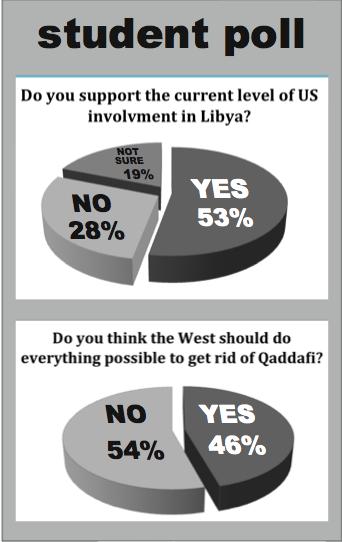In a recent nationwide poll by the Pew Research Center, 50 percent of Americans said they think that the US and its allies made the right decision by conducting air-strikes in Libya. 37 percent said it was the wrong decision, while 13 percent said they were unsure.
With a high population of Middle Eastern students and a growing number of veterans on campus, the Mass Media set out to explore the UMB perspective on the issues in Libya.
Most students support the US enforcing the no-fly zone, but said they were opposed to taking a greater part in the conflict. “No boots on the ground” was a common refrain.
At the Muslim Student Center, students largely supported US actions so far, but with some reservations.
“They [the US] need to be careful not to get too involved because it could easily turn into an imperialistic situation,” said Hamza Abdelgany, an economics major originally from Egypt.
Political Science major George Fakhry wanted a more definite strategy from the UN.
“They need to have a specific plan and a specific timeline with specific goals, and then let the Libyans have their right to self determination,” said Fakhry, who is originally from Lebanon.
Some worried that the motivation behind the intervention may not be completely humanitarian.
“They should be in Libya with the intentions of helping, not for gain,” said Lebanese IT major Muhamad Hachem. “Leave the oil to the people,” he added.
In the Veterans Center, the perspective was slightly different.
“I see the main difference between Iraq and Libya to be that the Libyans want our help. They asked for it,” said a student who has served in active duty for eight years, including combat stints oversees. He asked not to be identified.
“I don’t feel that the human rights problem in Libya is the most outrageous human rights issue in the world,” the student continued. “Is there a human rights issue? Yes, but if that is the only argument for getting involved, then there are other places we should be getting involved.”
He deemed US efforts so far as “appropriate,” but warned that if the UN’s final action is to establish the no fly zone, then the Libyan people will “likely end up in a bloody stalemate that could go on for years.”
One student said that UN involvement has been short sighted.
“At some point the shooting will stop,” said psychology and sociology major Om Goeckermann. “Whether it’s today or tomorrow depends on who’s supplying the bullets,” he said.
Goeckermann has been following the situation in Libya closely. He volunteers for Crisis Mappers, a nonprofit organization that uses a wide spectrum of sources to create dynamic, open source maps of crisis areas. Crisis Mappers’ goal is to “power effective early warning for rapid response to complex humanitarian emergencies.” And they have been successful, most notably in Haiti, where their maps are still used by aid workers, but also in Japan and Libya, where reports are filed and mapped by volunteers like Goeckermann around the clock.
Goeckermann believes the fighting should stop immediately. “In the near future, everybody will be sitting around the table and talking. Since we are going to get to that point anyway, we should do it right now,” he said.
Political science professor Leila Farsakh said she thinks the intervention was necessary, and that US part in it “shows the Arab world that the US can act as a defender of democracy rather than of oppressive regimes.”
Not everyone could decide on the issue. Nearly 19 percent of students polled said they are not sure whether they supported US involvement in Libya.
“I literally know nothing about it,” said one woman. She refused to comment further.





















































